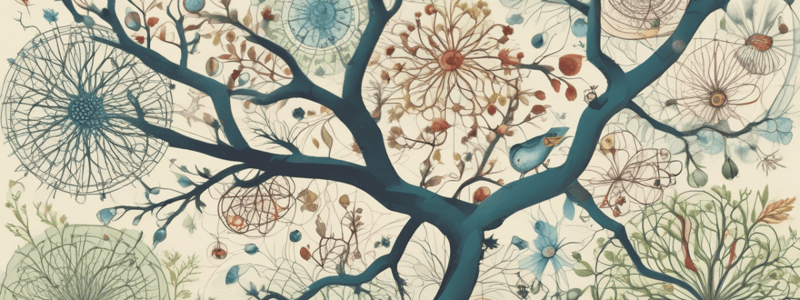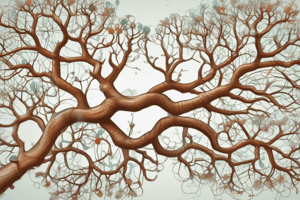Podcast
Questions and Answers
The ______ is the study of interactions between organisms and their environment.
The ______ is the study of interactions between organisms and their environment.
Ecology
The ______ is the basic unit of life.
The ______ is the basic unit of life.
Cell
The ______ is the genetic material that codes for traits.
The ______ is the genetic material that codes for traits.
DNA
The process of ______ is by which organisms adapt to their environment.
The process of ______ is by which organisms adapt to their environment.
The ______ is the formation of new species.
The ______ is the formation of new species.
The ______ are organisms that break down dead organic matter.
The ______ are organisms that break down dead organic matter.
Study Notes
Branches of Biology
- Botany: study of plants
- Zoology: study of animals
- Microbiology: study of microorganisms
- Ecology: study of interactions between organisms and their environment
- Biochemistry: study of chemical processes in living organisms
- Molecular Biology: study of biological molecules and their interactions
- Genetics: study of heredity and variation
- Evolutionary Biology: study of evolution and diversity of life
Cell Biology
- Cell: basic unit of life
- Cell membrane: semipermeable membrane surrounding the cell
- Cytoplasm: jelly-like substance inside the cell membrane
- Nucleus: control center of the cell
- Mitochondria: generate energy for the cell
- Ribosomes: site of protein synthesis
Genetics
- DNA (Deoxyribonucleic acid): genetic material
- Genes: segments of DNA that code for traits
- Traits: characteristics of an organism
- Inheritance: passing of traits from parents to offspring
- Dominant and recessive alleles: different forms of a gene
- Punnett squares: diagrams used to predict offspring traits
Evolution
- Theory of Evolution: explains diversity of life on Earth
- Natural Selection: process by which organisms adapt to their environment
- Speciation: formation of new species
- Fossil Record: evidence of evolutionary history
- Comparative Anatomy and Embryology: studies of similarities and differences between organisms
Ecosystems
- Ecosystem: community of organisms and their environment
- Producers: organisms that make their own food (plants, algae)
- Consumers: organisms that obtain energy by consuming other organisms
- Decomposers: organisms that break down dead organic matter
- Food Chains and Webs: diagrams showing energy flow through ecosystems
Branches of Biology
- Botany is the study of plants.
- Zoology is the study of animals.
- Microbiology is the study of microorganisms.
- Ecology is the study of interactions between organisms and their environment.
- Biochemistry is the study of chemical processes in living organisms.
- Molecular Biology is the study of biological molecules and their interactions.
- Genetics is the study of heredity and variation.
- Evolutionary Biology is the study of evolution and diversity of life.
Cell Biology
- The cell is the basic unit of life.
- The cell membrane is a semipermeable membrane surrounding the cell.
- Cytoplasm is a jelly-like substance inside the cell membrane.
- The nucleus is the control center of the cell.
- Mitochondria generate energy for the cell.
- Ribosomes are the site of protein synthesis.
Genetics
- DNA (Deoxyribonucleic acid) is the genetic material.
- Genes are segments of DNA that code for traits.
- Traits are characteristics of an organism.
- Inheritance is the passing of traits from parents to offspring.
- Dominant and recessive alleles are different forms of a gene.
- Punnett squares are diagrams used to predict offspring traits.
Evolution
- The Theory of Evolution explains the diversity of life on Earth.
- Natural Selection is the process by which organisms adapt to their environment.
- Speciation is the formation of new species.
- The Fossil Record provides evidence of evolutionary history.
- Comparative Anatomy and Embryology involve the study of similarities and differences between organisms.
Ecosystems
- An ecosystem is a community of organisms and their environment.
- Producers are organisms that make their own food (plants, algae).
- Consumers are organisms that obtain energy by consuming other organisms.
- Decomposers are organisms that break down dead organic matter.
- Food Chains and Webs are diagrams showing energy flow through ecosystems.
Studying That Suits You
Use AI to generate personalized quizzes and flashcards to suit your learning preferences.
Description
Discover the different branches of biology, including botany, zoology, and more. Learn about cell biology and the basic unit of life.




